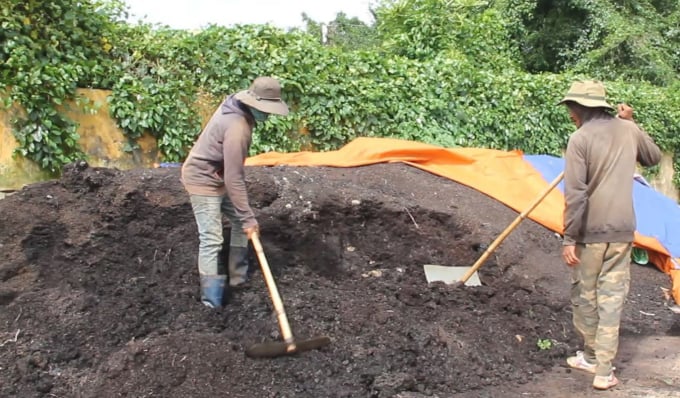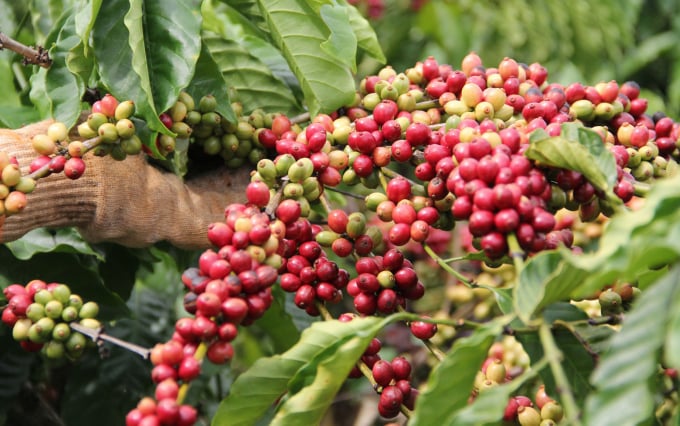May 17, 2025 | 03:08 GMT +7
May 17, 2025 | 03:08 GMT +7
Hotline: 0913.378.918
May 17, 2025 | 03:08 GMT +7
Hotline: 0913.378.918
The Western Highlands Agriculture and Forestry Science Institute (WASI) has established a standard technique for producing organic fertilizer from coffee shells and distributing it to farmers.
The coffee garden of Mr. Nguyen Xuan Thanh's (Buon Ma Thuot City, Dak Lak) which is organically fed with coffee shells, is lush with green trees and large fruit, in stark contrast to the previously undeveloped 1-ha garden with limited production.

After 3 months of composting, organic fertilizer from coffee shells can be used to fertilize plants. Photo: Quang Yen.
According to Thanh, he used to fertilize coffee roots using raw coffee shells. While this procedure aids in loosening the soil and weed control, the amount of nutrients received by roots is limited.
Because the shells were used in this manner, several hazardous microbes developed that cause diseases in coffee plants, such as fungus.
"When we use organic fertilizer in conjunction with other chemical fertilizers, our coffee plants become fully grown and green. Output exceeds 3 tons per hectare," Mr. Thanh stated.
According to engineer Nguyen Hai Duong of WASI's technical team, eggplant shells may be composted to provide organic fertilizer for plants after harvest. This not only saves money but also improves the root system of coffee trees, resulting in bigger, more uniform fruits than with traditional fertilizers.
Organic fertilizer made from coffee pods, in particular, has the function of decomposing and changing other organic substances in the soil into nutrients for plants. Fertilizers also increase the utilization coefficient of mineral fertilizers for plants, resulting in a decrease in the number of chemical fertilizers seeping into groundwater or sublimating into the air, resulting in environmental degradation, Duong explained.
According to engineer Nguyen Hai Duong, composting coffee shells involves six processes. To activate the bar, step one is to prepare coffee shells, manure, probiotics, and molasses sugar. The second step is to combine the components. The third stage involves first squaring the pile. After one month, turn the mound over down to thoroughly mix it. Step 5 is to square the mixture once again. Step 6 is to use this compost to fertilize the garden after three months.
"When brewing coffee, it is necessary to activate the yeast in order to increase the number of microorganisms. The humidity level of the compost pile should be monitored often, and it should be watered when it becomes dry. "When people incubate, they need to maintain a humidity level of 50-60 percent to ensure that the material swiftly rots, not for an entire year to become manure," engineer Duong explained.
Dr. Phan Viet Ha, deputy director of WASI, stated that the institution conducted research on specific probiotics to assist farmers in properly composting fertilizer and promoting the effectiveness of organic fertilizer made from coffee shells. Additionally, the team develops a method for composting organic fertilizer from coffee husks.

Thanks to organic fertilizer from coffee shells in a consistent process, coffee grows well and gives a high yield. Photo: Minh Hau.
Mr. Ha asserts that improper composting slows the decomposition process, reducing the efficiency of fertilizers.
According to the doctor, the Institute has discovered a method for composting coffee shells to create organic fertilizer. Farmers that adhere to this procedure will create superior organic fertilizer.
"Organic fertilizing using coffee shells improves soil quality and increases the efficiency of chemical fertilizers for coffee and other plants. Because this is a microbial organic fertilizer, it will also supply beneficial microbes to the soil, assisting plants in resisting soil illnesses. In general, those who apply organic fertilizer made from coffee shells will foster the growth and improvement of beneficial microbes in the soil," Mr. Ha stated.
Additionally, Mr. Ha stated that a few years ago, residents of Dak Lak raised wood-ear mushrooms using coffee shells as a substrate. Due to the nutrient-dense nature of coffee shells, mushroom production is excellent. At the moment, some individuals continue to cultivate mushrooms on coffee shells.
Additionally, the deputy director stated that many individuals now compost coffee shells. To increase the usage of organic fertilizer made from coffee skins, the Institute has urged that professional organizations increase communication about the fertilizer's benefits. The Institute will continue to conduct training sessions to facilitate the transfer of the manufacturing process. This teaches individuals how to properly create organic fertilizer.
"The critical responsibility now is to transfer the process to ensure that it is implemented correctly. This enables individuals to get the most out of this fertilizer. Tens of thousands of farmers have access to the Institute's technology for producing organic fertilizer from coffee husks. However, because the Institute is located in a remote location, the products are inaccessible to a large number of individuals. The Institute will continue to work with companies to improve people's access to this product in the future," stated WASI's Deputy Director.
Nearly two decades ago, the Western Highlands Agro-Forestry Science and Technology Institute recognized the potential of coffee shells as a crop fertilizer.
Between 2005 and 2008, WASI undertook scientific research on probiotics in order to improve coffee brewing products. The Institute has developed a microbial product for composting from coffee husks after three years of study and testing.
Currently, WASI is transferring microbial fertilizers to farmers through partnership with functional agencies and agricultural corporations.
Translated by Linh Linh

(VAN) Cold-barn systems efficiently manage environmental and temperature conditions, which aids in the prevention of respiratory diseases in pigs and protects them from the vectors that transmit African swine fevers.

(VAN) To tackle challenges, the project 'Addressing key technical bottlenecks in the grouper supply chain in Vietnam' has been underway since 2024.

(VAN) The project 'Disease-Resilient and Sustainable Cassava Production Systems in the Mekong Region', funded by the Australian Center for International Agricultural Research (ACIAR), is being implemented from 2024 to 2028.

(VAN) Data from 10,000 farming households will help professionalize production organization and support the implementation of the One Million Hectares Program for High-Quality, Low-Emission Rice Cultivation.

(VAN) FAO Director-General QU Dongyu marks International Day of Plant Health at NENA conference.

(VAN) Deputy Minister of Agriculture and Environment Hoang Trung affirmed that floriculture and ornamental plants are a growing industry that receives significant global attention.

(VAN) The three staple crops dominating modern diets – corn, rice and wheat – are familiar to Americans. However, fourth place is held by a dark horse: cassava.